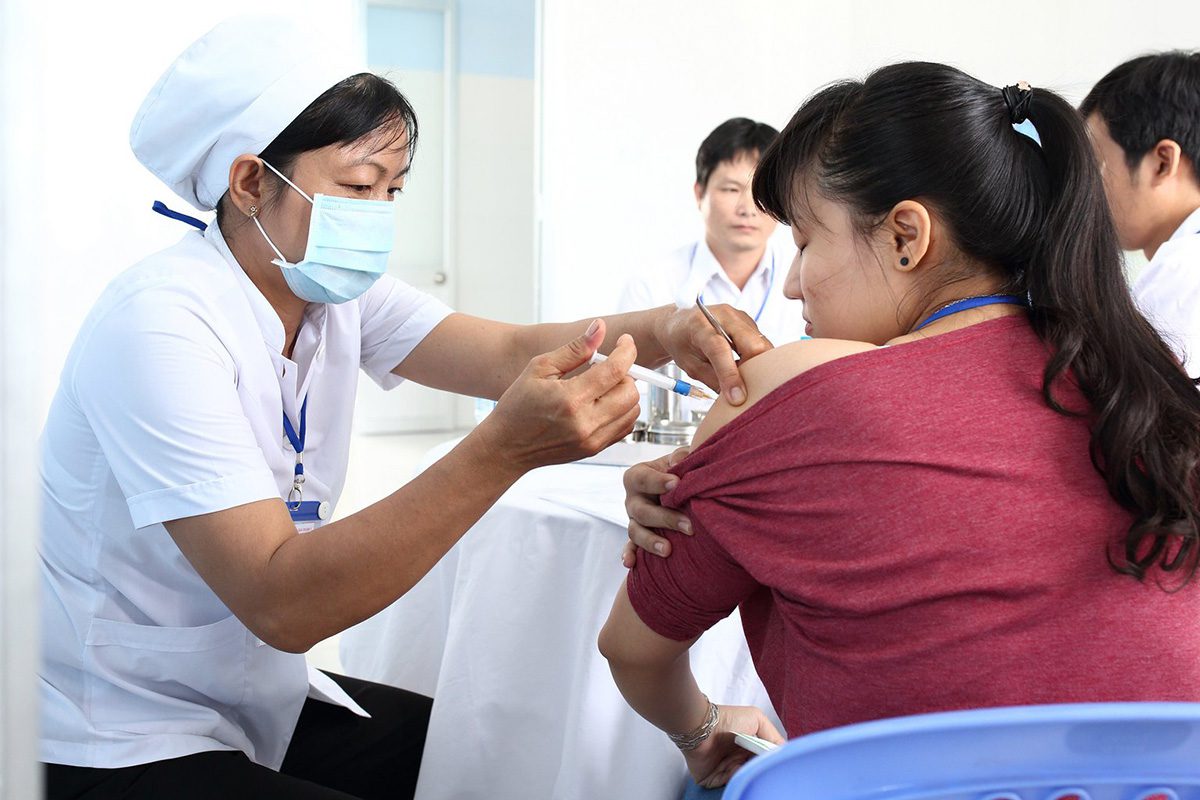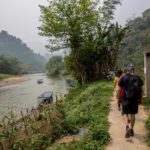
Travel to Vietnam: what to know about vaccination
You’re planning a trip to Vietnam, and that’s a great choice. You’ll be amazed by its spectacular landscapes and rich and diverse culture. One of the questions to consider before traveling is about vaccinations.
In this article, we will guide you on the required and recommended vaccines before traveling to Vietnam, so you can fully enjoy your adventure in safety and serenity.
Table des matières de l'article
Preparing your vaccination record
Before flying to Vietnam, the first essential step is to check and update your vaccination record. Make sure you have received the recommended basic vaccines for protection against common diseases such as diphtheria, tetanus, polio, pertussis, and measles. These routine vaccines are important for all travelers, regardless of their destination, and will also protect you in your daily life.
To ensure that your trip is well-planned from a health perspective, it is highly recommended to consult a travel medicine doctor. These professionals are specially trained to provide personalized health advice related to international travel. During your consultation, inform the doctor of your planned itinerary, activities, and current health status. They can then recommend the appropriate vaccines based on your specific situation.
Mandatory vaccins for travelling to Vietnam
When planning your trip to Vietnam, it is essential to inquire about the mandatory vaccines based on your country of origin. Rules and regulations regarding vaccines vary from one country to another, and it is important to comply with Vietnam’s requirements to avoid any issues upon arrival.
Vietnam may have specific vaccine requirements depending on the countries from which travelers originate. Some nationalities may be subject to specific vaccination rules, especially if they come from regions affected by epidemics. For this reason, it is crucial to consult the Vietnamese embassy in your country or the relevant health authorities to obtain the most up-to-date information on mandatory vaccines.
Vietnam may require travelers from countries affected by certain epidemics to be vaccinated before granting them entry to its territory. These requirements are aimed at protecting the local population and preventing the spread of potentially dangerous diseases. Vaccines against yellow fever and typhoid fever are among those that may be mandatory for travelers coming from regions where these diseases are prevalent.
For tourists coming from USA, Canada or Australia, Vietnam typically does not require mandatory vaccinations. However, it is strongly recommended to ensure that basic vaccinations such as diphtheria, tetanus, polio, pertussis, and measles are up to date, as mentioned in Part I. It is also advisable to get vaccinated against typhoid fever, hepatitis A and B, as well as Japanese encephalitis for enhanced protection during your trip.
Recommended vaccins
Typhoid fever
Typhoid fever is a bacterial infection caused by the bacterium Salmonella typhi. It primarily spreads through the consumption of water or food contaminated with the feces of an infected person. The risks associated with typhoid fever during a trip to Vietnam can be significant, especially in areas where hygiene and sanitation standards may be less stringent.
Vaccination Schedule: The typhoid fever vaccine is administered in two forms: the injectable vaccine (inactivated form) and the oral vaccine (attenuated form). For effective protection, it is recommended to follow a complete vaccination schedule, which may vary depending on the type of vaccine used. The inactivated vaccine typically requires a single dose, while the oral vaccine usually involves a series of capsules taken on specific days. Travelers should consult their healthcare professional to determine the most appropriate vaccination schedule based on their individual circumstances.
Hepatitis A and B
Hepatitis A and B are viral infections that affect the liver and primarily spread through the consumption of contaminated water or food (hepatitis A) or through contact with blood, bodily fluids, or unprotected sexual intercourse (hepatitis B). The risks of contracting these diseases are higher in regions where hygiene standards may be insufficient.
Vaccination Schedule: Vaccines for hepatitis A and B are available and can be administered separately or combined in a single vaccine. For complete protection, it is essential to follow the vaccination schedule recommended by health authorities and your healthcare professional.
The number of doses and the vaccination schedule may vary depending on the vaccines used, the traveler’s age, and their previous immune status. In general, multiple doses administered over a period of several months are needed to achieve adequate immunity.
Japanese encephalitis
Japanese encephalitis is a viral disease transmitted through mosquito bites, primarily found in rural and agricultural areas of Southeast Asia, including Vietnam. Travelers planning to spend time outdoors in high-risk regions are particularly vulnerable to this potentially severe infection.
Vaccination Schedule: The Japanese encephalitis vaccine typically requires two doses administered over a one-month period, with a recommended booster every one to two years. It is advisable to start vaccination at least one month before travel for adequate protection.
Rabies
Rabies is a serious viral disease that spreads through the bite or scratch of an infected animal. Risks of contracting rabies exist with close contact with animals, including dogs, cats, bats, and other mammals, especially in regions where rabies is present.
Vaccination Schedule: The rabies vaccine also requires multiple doses administered over a specific period. It is essential to start the series of vaccinations as early as possible, especially if the traveler plans to come into contact with animals that may potentially carry rabies.
Vaccin preparation : timeline and boosters
Recommended timelines before travel for vaccines to be effective
It is essential to plan vaccination while considering the necessary timelines for vaccines to become fully effective before travel. Some vaccines require multiple doses administered at specific intervals to develop adequate protection. Here are some examples of recommended timelines for certain common vaccines:
Typhoid Fever
The inactivated typhoid vaccine provides protection after one dose, but it is best to get vaccinated at least two weeks before travel to allow the immune system to develop a protective response. For the oral vaccine, the series of capsules should be completed as per specific recommendations, which may take several days.
Hepatitis A and B
The complete vaccination schedule for both diseases typically involves multiple doses over several months. Therefore, it is crucial to start vaccination well before the trip. However, even a single dose of the hepatitis A vaccine can offer some protection, and it is recommended to get vaccinated at least two weeks before departure, if possible.
Japanese Encephalitis
The Japanese encephalitis vaccine usually requires two doses administered over one month, with a booster recommended every one to two years. It is advisable to start vaccination at least one month before the trip for adequate protection.
Rabies
The rabies vaccine also requires multiple doses administered over a specific period. It is important to begin the series of vaccinations as early as possible, especially if the traveler plans to come into contact with potentially rabies-carrying animals.
Vaccines requiring boosters before departure
Some vaccines require boosters before departure to ensure ongoing protection during the trip. This is often the case for vaccines that provide long-term immunity but require booster doses to maintain that protection. Boosters aim to enhance the immune response and ensure lasting immunity. The following vaccines may require boosters before the trip:
Japanese Encephalitis
As mentioned earlier, the Japanese encephalitis vaccine requires boosters every one to two years to maintain effective protection, especially for frequent travelers to at-risk regions.
Hepatitis A and B
Depending on the type of vaccine used, boosters may be required to maintain long-term immunity against hepatitis A and B. Specific recommendations may vary, and it’s important to follow the advice of a healthcare professional.
Vaccination planning based on travel duration
The duration of the trip plays a crucial role in vaccination planning. For short trips, it may be necessary to accelerate the vaccination schedule to ensure adequate protection before departure. In the case of longer trips, it is also essential to plan for the necessary booster shots to maintain immunity throughout the duration of the stay. If a traveler does not have enough time to complete a full vaccination schedule before departure, it is important to discuss with a healthcare professional the available options to achieve maximum protection within the time frame. Some vaccines may offer some protection even after a single dose, while others may require an accelerated dosing schedule.
In conclusion, vaccination before traveling to Vietnam is essential to protect your health during this unique travel experience. From the picturesque rice terraces of Sapa to the majestic karst formations of Halong Bay, every corner of the country offers a fascinating adventure.
However, traveling in new environments comes with risks such as waterborne diseases, mosquito bites, and contact with animals. Pre-travel vaccination is therefore crucial to guard against these hazards.
In addition to vaccination, it is recommended to take additional health precautions during your trip, such as frequent handwashing, consuming bottled water, avoiding raw foods, and using mosquito repellent products.
Consult a travel doctor for personalized advice and make the most of your journey to Vietnam by exploring its wonders, immersing yourself in its culture, and creating unforgettable memories.
Safe travels to this enchanting land !
[/vc_column_text][/vc_column][/vc_row]





